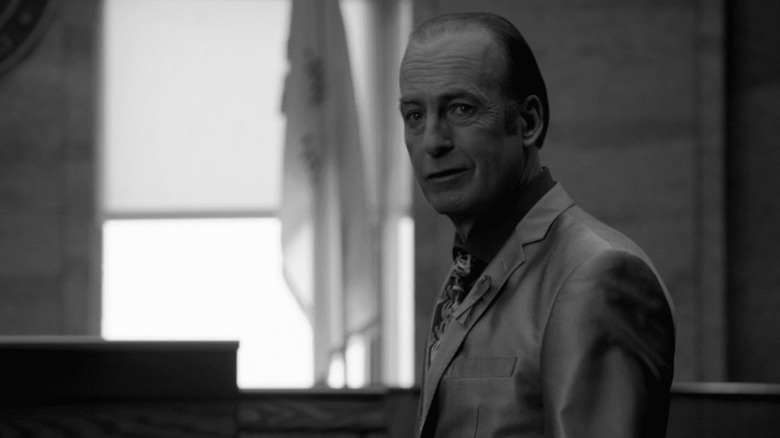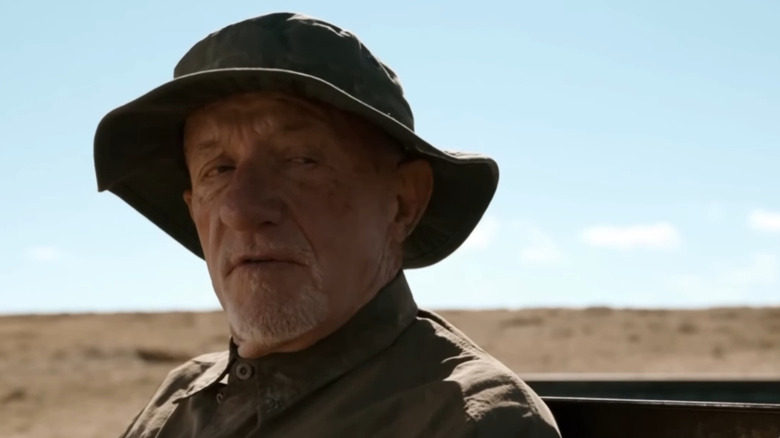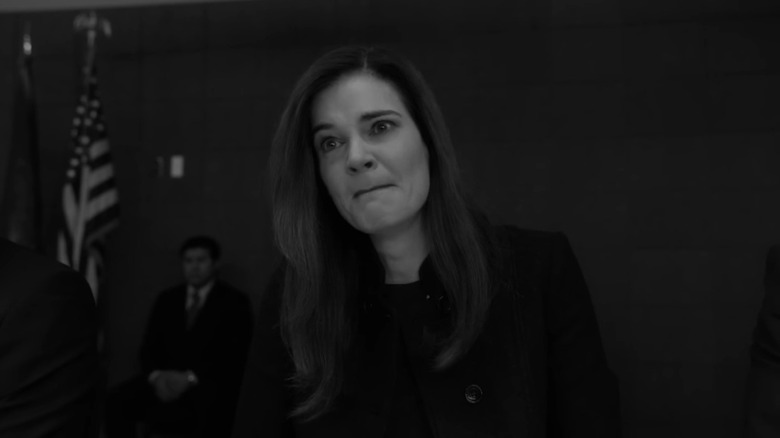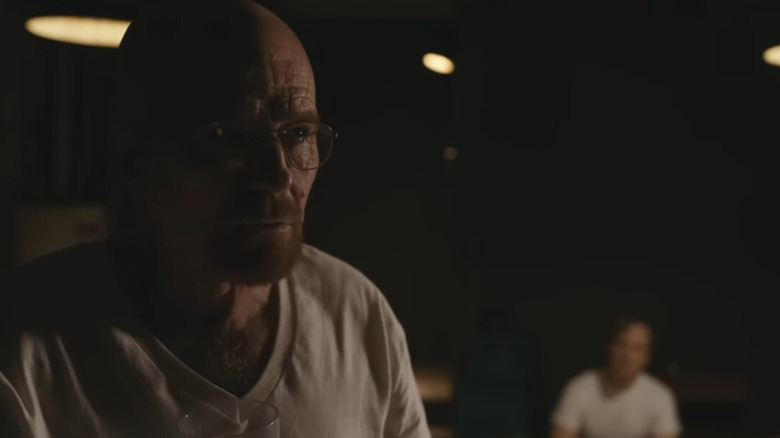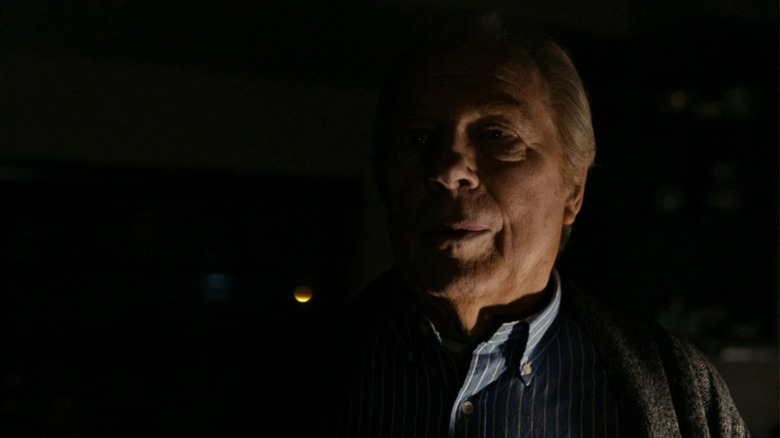The Better Call Saul Finale Featured The Show's Most Effective Cameos
Major spoilers for the final episode of "Better Call Saul" follow.
This might be a controversial opinion, but the series finale of "Breaking Bad," appropriately titled "Felina," has one major flaw. While it certainly gave closure to the story of Walter White (Bryan Cranston), egregious fanservice helped pave that way. The involvement of Badger (Matt Jones) and Skinny Pete (Charles Baker) in his final act of revenge against the Schwartzs (Adam Godley and Jessica Hecht) always felt a bit contrived, like the point of the scene was to shoehorn in these characters first in order to clumsily tie up loose ends. It's a bit of a tedious scene in an episode that is otherwise wonderfully paced and executed.
"Better Call Saul's" finale, "Saul Gone," did have its fair share of cameos and surprise appearances, but it didn't fall into that same fanservice trap as "Felina" did. The appearances of both expected and unexpected characters felt more organic than any other cameo in both the original series and its law-based spinoff because they felt like they stood for something deeper. They served their unique purposes that ultimately led to the final decision Jimmy (Bob Odenkirk) makes, rather than just something fans of both series can point at on their television screens. Without these appearances, it is likely that the series could have ended on a very different note.
Mike and Jimmy's individual descent into crime
In the opening scene of "Saul Gone," viewers get a flashback to the events of the season five episode, "Bagman," where Jimmy is tasked with transporting $7 million from the desert back to bail Lalo Salamanca (Tony Dalton) out of jail. Along on this journey is Mike (Jonathan Banks), who he rests with when the duo finds a well of water.
As they sit in the New Mexico heat, Jimmy asks Mike what he would do with a time machine. It's a question that seems out of place at first but makes more sense when you hear what the older man has to say. He explains that he would go back to the year 1984, as that was the year he took his first bribe. While he doesn't say what he'd do, it's more than likely that Mike would want to reverse that decision and not take it at all. He also explains that he'd go forward in time "to check up on some people," presumably meaning his daughter-in-law Stacey (Kerry Condon) and his granddaughter Kaylee (Faith Healey, Abigail Zoe Lewis, and Juliet Donenfeld).
This question and Mike's subsequent answers showcase the former police officer as someone who doesn't want to be doing what he's doing. He likely took the bribe while on the force, sending him down a rabbit hole of further crimes before eventually ending up where he was at that point. This isn't too dissimilar to how Jimmy ended up in the hands of the cartel, showcasing how both men wish they could have avoided all of this altogether.
Marie and the consequences of Jimmy's actions
Unfortunately, Jimmy did not ignore the signs that he was heading toward a dangerous path. Instead, he persisted down this path until there was utter destruction in his wake. One of those whose lives he was destroyed, albeit indirectly, was Marie Schrader (Betsy Brandt), the widow of DEA agent and brewmaster extraordinaire Mike Schrader (Dean Norris).
She made a significant appearance during Jimmy's pre-trial negotiations, starting off with the damning sentence "they told me they found you in the dumpster." She then described how much his selfish actions ruined the lives of herself and so many others. The kicker is that she isn't wrong; while he didn't directly kill Hank, he certainly had no problem covering it up and pretending like it was a noble thing to do. His complacency makes him just as culpable for the murders of Hank and his partner, Steven Gomez (Steven Michael Quezada). Considering that Walter is now dead and his lab partner, Jesse (Aaron Paul), is on the run, the next logical person to punish is Jimmy.
At the end of the day, Jimmy knows that he has never always been a good person. He has done some truly horrible things, and Marie symbolizes everyone that he has ever hurt along the way. She represents all of the people he has scammed over the years and the lives that were lost because he helped to progress the Heisenberg operation.
Walter and what Jimmy could become
Let's make this very clear; Walter White is an evil, irredeemable man. While he's developed this reputation as a male character worshipped by dudebros, there is no denying that he deserved almost every awful thing that happened to him throughout "Breaking Bad." He only cared about himself and not really about his family or business partners.
This is exactly why that flashback to after the events of "Ozymandias" from the fifth season of "Breaking Bad" was so important. In their safe house, Jimmy asks Walter the same question he asked Mike; what would you do with a time machine? Walter's first response is to berate him for asking, saying that time travel is a logistical and scientific fallacy that is impossible to achieve. However, when Jimmy rephrases the question so that, theoretically, it could be possible, the former science teacher says that he would get some sort of revenge on the Schwartzs (Adam Godley and Jessica Hecht) for forcing him out of Gray Matter, the company he helped create with them. He then goes back to berating Jimmy when he says that he should've told the lawyer so that a lawsuit of some kind could be filed.
The further Jimmy went without any real consequences, the more selfish and disconnected from humanity he became. Unlike Walter, he knew that he couldn't be able to live with himself knowing about all the awful things he had done. If Jimmy hadn't run away and eventually confessed his crimes in that courtroom, he could have easily become distant, cold, and evil like Walter did.
Chuck and what Jimmy left behind
Finally, the most heartbreaking cameo of them all, as well as the most resonant, is where the time machine motif came from. In a scene set before any of the events of "Better Call Saul," Jimmy is seen visiting his brother, Chuck (Michael McKean), and dropping off groceries. As many fans of the show know, he wasn't supportive of his younger brother's decision to go into law, especially given his history as a scam artist.
This was something reiterated to Jimmy during this flashback, albeit a bit kinder than the sentiments would eventually become. Chuck tells his brother that it is more than fine if he decides that law isn't something he wants to do. He can go back and change his path any time he wants, and he wouldn't be upset with him. Jimmy maintains that he genuinely does want to be a lawyer, but understands what Chuck is trying to tell him, presumably keeping it in the back of his mind for the duration of the series. As he leaves his brother's house, we see that a copy of H.G. Wells' "The Time Machine," which was seen in his own home at the beginning of season six, lays on Chuck's dining room table.
Jimmy regrets everything that he put Chuck through, even if he had his own personal flaws to deal with. While on the stand at his arrangement, he confesses that his actions inadvertently led him to commit suicide. Chuck is the most concrete symbol of the life that Jimmy used to live, a successful and loving life where he genuinely was trying to be a good person. In order to try and achieve that life again, he confessed to everything on that stand, the EXIT sign buzzing all the while.
